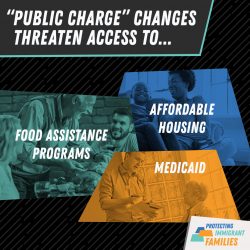
The Trump administration is moving forward with its effort to radically change the federal policy under which immigrants are deemed a “public charge.” Unless the rule change is defeated in a legal challenge, we can expect millions of children to lose out on the resources and opportunities they need to thrive. Tens of thousands of those children – most of whom are actually U.S. citizens – live here in Arkansas.
What will change?
The term “public charge” has long been used to identify people who may depend on government benefits as their main source of support. In 1891, the U.S. Congress included “persons likely to become a public charge” as a category of people who would not be allowed to enter the United States. In the past, only cash assistance and government-funded long-term care have been considered disqualifying conditions.
Under the new rule, released today and set to become final on Oct. 15th, immigration officials would consider a much broader range of assistance. Benefits considered a “public charge” would include SNAP, Medicaid and housing assistance, among other programs. As part of a scored test, they would also take into account a family’s income. As a result, immigrants could be deemed a public charge even if they’ve never applied for benefits but are deemed likely to do so in the future.
This amounts to a wealth test that will turn upside down the long-held American belief that through hard work, we can prosper, and our children will have better lives as a result. It threatens families’ pathways to obtaining green cards simply because they’re working in low-paying jobs.
To be clear, this rule change is not aimed at undocumented immigrants, who already are not allowed to use public programs like nutrition or housing assistance. Instead, the rule is another in a series of this administration’s policies targeting families who live and work here lawfully, including their U.S. citizen children.
What does this mean for Arkansas?
At Arkansas Advocates, we are particularly concerned about the effect this rule change will have on children of immigrants. Around 78,000 of Arkansas’s children live with at least one foreign-born parent. They are mostly Hispanic children who were born in the United States, and whose parents are lawfully living and working in Arkansas and strengthening our state’s economy.
We are additionally concerned about the effect it may have on Marshallese migrants who live in Arkansas. They are free to live and work in the United States under a Compact of Free Association with the Republic of the Marshall Islands – long established as the result of the United States testing nuclear weapons in the islands. As written, Compact migrants are not carved out as an exception to the new rule.
This rule could make parents choose between their children’s needs and furthering their efforts to become permanent residents. For others who are low-income, it would deny their ability to enter the country lawfully in the first place.
Fortunately, as proposed, children’s health insurance like ARKids First would not count as a “benefit” under the public charge rule. But families have already shown reluctance to sign up for such programs, even for their citizen children, because they’ve heard their legal immigration could be jeopardized if they sign up. Research shows that Medicaid coverage for kids results in many benefits, not just for the individual, but for entire communities. Arkansas’s rate of uninsured children has recently risen, and the state will suffer further if more children go without health insurance.
What now?
Keeping families from accessing the assistance they need is not the way we ensure a strong start and stable future for the children of Arkansas. Many organizations are fighting back, and litigation is coming. Check out Protecting Immigrant Families for more information.
